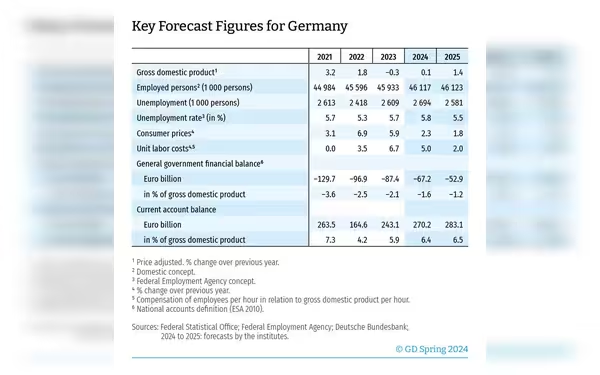Thursday, July 4, 2024 07:28 PM
German Economy Ministry Revises Growth Forecast Upward
- Economy ministry predicts 0.3% growth for 2024, up from 0.2%
- Inflation forecast revised downwards to 2.4% for this year
- Challenges remain despite positive indicators, including supply chain disruptions
 Image Credits: Nachrichten aus der Wissenschaft » idw
Image Credits: Nachrichten aus der Wissenschaft » idwThe German government revises its 2024 growth forecast, indicating a slight increase in economic expansion. Despite positive indicators, challenges persist, requiring sustained efforts for long-term growth and stability.
The German government has revised its 2024 growth forecast, indicating a slight increase in economic expansion. The economy ministry now predicts a 0.3 percent growth for this year, up from the previous estimate of 0.2 percent. This adjustment follows positive developments in key indicators such as factory output and business activity, suggesting a potential turnaround for Europe's largest economy.
In response to these improvements, Economy Minister Robert Habeck highlighted the growing signs of an economic upturn, emphasizing the recent surge in positive indicators. The ministry also revised its inflation forecast downwards to 2.4 percent for this year, with expectations of a further decrease below two percent in the following year.
The recent decline in energy prices, coupled with improvements in supply chain disruptions, has contributed to the more optimistic outlook. Despite initial expectations of a stronger rebound in 2024, the economy faced challenges last year, including inflation, manufacturing slowdowns, and external weaknesses.
While the German economy is showing signs of recovery, officials remain cautious about the pace of growth in the coming years. Habeck stressed the need for addressing underlying issues such as an ageing population, labour shortages, and a slow transition to greener industries to enhance Germany's competitiveness.
Challenges persist, including disruptions from pandemic-related supply chain issues, the aftermath of the Russia-Ukraine conflict, and ongoing struggles in trading partners like China. The European Central Bank's potential decision to reduce borrowing costs could provide a boost to the eurozone, but uncertainties remain regarding the timing of monetary policy adjustments.
Despite the positive economic indicators, internal disagreements within the ruling coalition pose obstacles to revitalizing growth. The call for an 'economic turnaround' by the FDP party has sparked debates over the sustainability of projected growth rates and the necessity for immediate action to address economic challenges.
In conclusion, while the German economy is showing signs of improvement, sustained efforts are required to overcome existing hurdles and ensure long-term growth and stability.













